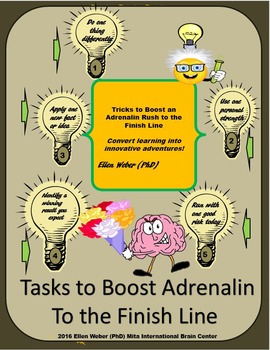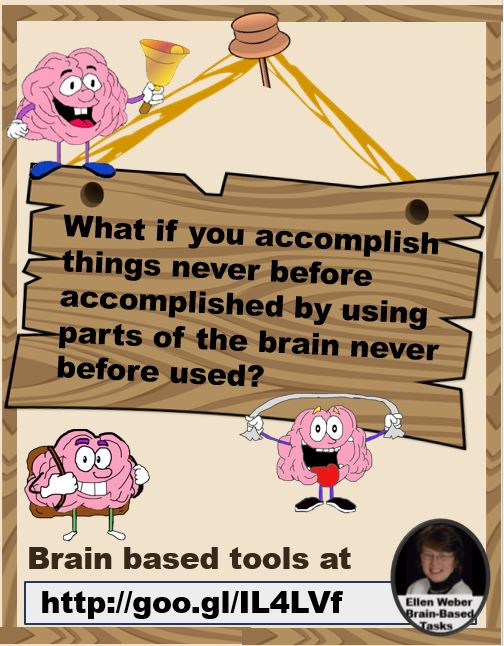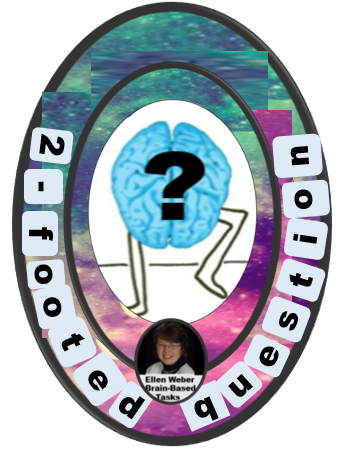We may take comfort in the fact that nobody is perfect. Yet when our imperfections become annoying or harmful habits, it’s time for a brain busting coping mechanism to kick a practice or pattern that’s doing us in.

Fortunately our brains come fully equipped to bust bad habits, and we can help ourselves and one another to make it happen. Below are ten steps that can nudge us away from that mental dungeon that holds us back, and open fresh meadows that inspire us forward with surprising new freedom.
Bad habits are rarely easy to get rid of. But these brain-friendly actions can inspire us to make significant changes on a daily basis.
- Isolate one bad behavior we hope to eliminate.
That’s easy we say, until we name the first problem practice that rubs us the wrong way. It takes more thought than identifying a vague habit, such as, “I fight with or ignore a family member.”
We need to prime the brain’s plasticity (or ability to change itself) by putting our memory’s tin cup down deeper and pumping until we drill down to a tangible behavior we can see in action.
In other words, our bad habit may be that we judge and often criticize that family member. Perhaps we condemn the person’s lack of belief as we believe, or find fault with the way children are being raised. Judgment takes many forms –most of which prevent a loving relationship with the person we judge.
- Step slowly in a new direction with motivators
The brain uses our world to ditch a bad habit for a better alternative. If we reward ourselves after even one positive consideration every time we sense a negative thought about a person we judge, we begin to lay down new neural connections for a closer relationship with that person. The reward could be as simple as check marks every time we redirect our thoughts from to liability to loving, over a three week period.
Our brain takes time to remove one habit and replace it with a better option, and by rewarding even the tiniest step, we help to kick start the plasticity that creates change. By being patient and kind to ourselves we add mental assets such as serotonin, (the brain’s aha chemical) to boost our efforts.
Try focusing on one favorable trait that others would identify in a person you dislike, and our brains will fade out cortisol chemicals and kick in to inspire additional small but meaningful values we begin to see. When we replace a critical reflection, with a lovable asset, the brain shifts our negative judgments into valued views of that person’s worth.

- Log Daily Progress
While it takes time to get rid of a bad habit, it’s also true that what we see and record is what we can become in the end. From the moment we decide to change a habit, we can list every step we take to stop one practice by doing its opposite. Simply by recording every time we catch ourselves judging a loved one, and we shift to a finer visual of that person’s value, we are conquering the harmful habit by building a more hopeful mental pathway forward. No wonder our lives will begin to follow this new opportunity when we simply apply our brains’ social and emotional tools.
Perhaps we are the only one to see progress for awhile, as the person we’ve judged may be somewhat skeptical of our intentions. That lack of trust too will change over time, as our actions begin to reflect the new neural pathways we’ve laid down by exchanging judgments for genuine appreciation of that person.
- Expect to slip back into bad habits at times
Regardless of our finest intentions, we stumble back into bad habits when we least expect it. That is not a time to beat up on ourselves or drop our efforts to pick up the pieces, let go of our fragile slips, and step forward again with the same determination we held at the beginning of our quest to improve a practice that’s doing us in. New research studies show that when we forgive ourselves, and forgive others, we sleep better and enjoy better health.
Notice that kicking bad habits starts deep within us, and tends to involve kindness, care and confidence that we count. Not only will we thank ourselves but we’ll quickly bounce back to becoming what we hope others see in us.
- Acknowledge every sign that progress is possible
A good friend of mine was ready to leave her husband, and used this brain-friendly method to restore her bonds with the man she married twenty years earlier. Rather than see his angry outburst, she began to see that he disliked his job in spite of endless efforts to make it work. She ignored his refusal to shave or wear clean clothes on weekends, by agreeing to activities they both enjoyed and then laying out clothes he’d enjoy wearing to these events.
No visible change occurred the first few days, but Amy’s mental awareness of Bill’s inner worth helped her to kick the habit of seeing only his vices. When we replace a bad habit with a better one as Amy did, the original vice added lesser biological benefits than our substitute actions. Even before Bill began to shift back into a kinder, more loving partner, Amy felt better for her new ability to see her husband in a caring way we cannot see another’s inner worth while we are condemning their behavior.
- Adjust our settings to accommodate new goals
When we frequent the same settings that enabled us to repeat the same behaviors change is often too hard to notice. And our failures may also become too subtle to recognize. If we continue going for coffee weekly with a critical person, with whom we judged and complained about a loved one or an annoying peer, we may well slow down or stop our progress in that setting.
Because the brain uses our world to improve our habits, our environment become a cue to return to habits we practiced there. Switch up our setting, by moving to a new spot, or inviting a caring person along and we can block the opportunities for bad habits to return.
If poor food habits plague us for example, we might remove junk food from the pantry to make sugar or fats less accessible. By stacking healthier snacks on our shelves we make it easier to gain better eating habits over time. I found this to be true when I removed junk food from my cupboards, so that it became far easier to reach for a healthy snack in the evening when I was tired and less likely to consider better dietary consequences. Our brains respond to improved triggers we set up deliberately, and they also sidestep harmful triggers that lure us back into bad habits we hope to kick.
- Tutor ourselves into better habits
The brain treats habits as loops it was coached to repeat automatically because we repeated these habits over time. It is cued by triggers that offer us a reward from say judging another person, and then repeating that harmful behavior by justifying it. “We have to hold him accountable,” Joe said of a peer he disliked. To shift criticism into care we build an action plan that helps our brains to disrupt the trigger-repeat-reward with better habits that reboot our care and barricade criticism under all its guises. So it no longer reward us to criticize and then claim we love a person, but hate their lifestyle, for instance. Nor do we feel driven by a desire to “hold dis-likable people accountable,” after we exchange fault-finding triggers into caring encounters.
Good habits start from deep inside us, and are generated to replace bad alternatives when we challenge ourselves to higher ground. Let’s say we start the day by asking, “What’s most important today to add another brick to my legacy?” Now we are ready and triggered to step toward that “identified event,” with one key action that illustrates keen purpose alive in our day.
- Be gentle and kind to ourselves
The brain’s ability to alter bad habits may not happen overnight, but we see progress far faster when we start with an inner kindness. We see its opposite whenever we find ourselves upset, frustrated, sad, lonely or disappointed because our efforts to move forward slipped into setbacks. Personal care recognizes that change and growth takes time. Our brains begin to form new neural connections and for delightful behavior patterns to kick in when we let go of regret and embrace possibilities. Rather than beat up on ourselves when evidence of change doesn’t follow instantly, we laugh at the little things and move on as caring people do. A strong intrapersonal IQ grows when we simply bounce back deliberately after inevitable slip-ups, and do not use personal weakness as a rationale for giving up.
- Plan a doable way forward beyond relapses
No question, every change effort becomes susceptible to bad days. Relapses are not only normal, they can become our best triggers to move back on track with a keen sense of why we slipped up in the first place. New insights about how we can avoid slipping up in future are accompanied by reflecting on two footed questions, such as.
- What would I do differently to see more good in myself and others?
- What would I enjoy more than this bad habit and how can I achieve that?
- If I were to teach another person how to break a bad habit, where would I start?
When trying to build a new habit, chances are we’re going to have to break an old one. Likely more than once. We tend to continue doing bad habits because they hook into the brain’s reward center, and give us false satisfaction or harmful psychological incentives to keep going in the same direction. By finding fault with a sibling or a child, we may find ourselves thinking we are better behaved and more deserving of unconditional kindness than the person we judge negatively.

- Visualize and enjoy triggers for better habits
Whenever we catch ourselves thinking judgmental thoughts or lingering over negative feelings concerning our own or others’ bad habits we literally open a new opportunity for progress. Once we identify the bad habit that pulls us in a harmful direction, we get to make new decisions that conquer that bad behavior. Over time, we become more aware of triggers that usually contribute to a bad habit, especially after we learn to recognize what’s behind those behaviors. That’s the very moment where we begin to put into a place a caring thought or action in place of a judgmental one. It starts with kindness to ourselves! We begin to forgive ourselves in ways that allow us to forgive others more and judge less. You could say we begin to take that first of 10 entry points into brain-friendly pathways that bust bad habits, without busting us.



